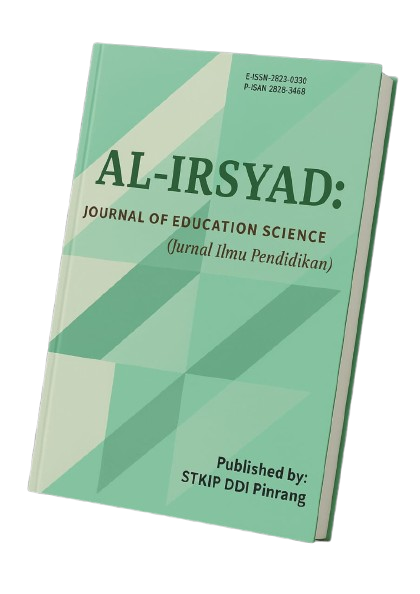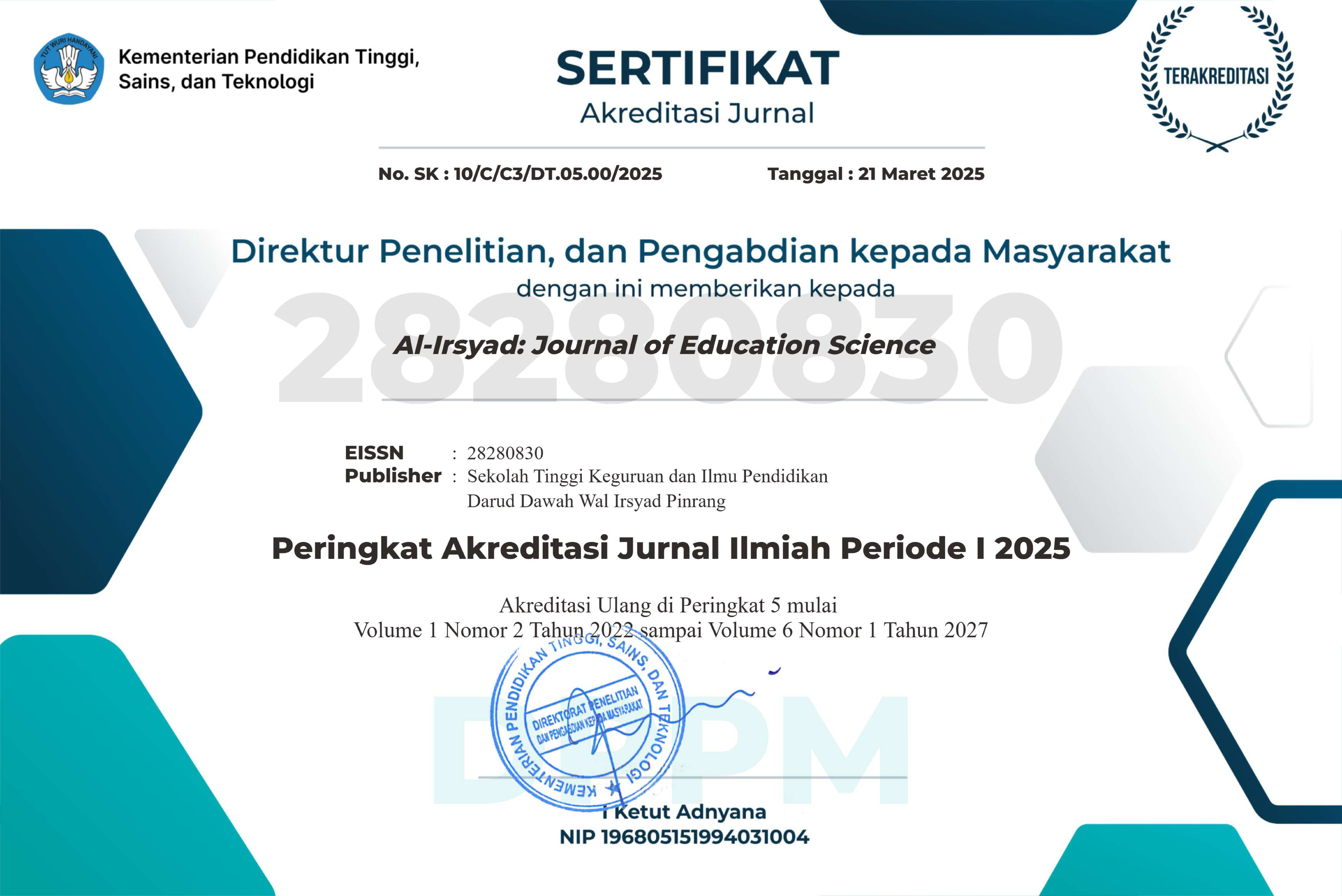ANALYZING THE USE OF QUIZIZZ IN VOCABULARY DEVELOPMENT FOR JUNIOR HIGH SCHOOL STUDENTS
DOI:
https://doi.org/10.58917/aijes.v4i2.170Kata Kunci:
Junior High School Students, Quizizz, Vocabulary DevelopmentAbstrak
This study aims to analyse the use of the online learning platform Quizizz in the vocabulary development of junior high school students. The primary focus is to evaluate the effectiveness of Quizizz as a learning tool in enhancing English vocabulary mastery. A quantitative approach was employed using a quasi-experimental design involving two groups of students: an experimental group using Quizizz and a control group using traditional methods. The results indicate that students who used Quizizz showed a significant improvement in vocabulary acquisition compared to those in the control group. These findings suggest that the use of Quizizz not only increases student engagement but also positively impacts their academic achievement in vocabulary learning. The study recommends integrating Quizizz as part of vocabulary teaching strategies in junior high schools.This study aims to analyse the use of the online learning platform Quizizz in the vocabulary development of junior high school students. The primary focus is to evaluate the effectiveness of Quizizz as a learning tool in enhancing English vocabulary mastery. A quantitative approach was employed using a quasi-experimental design involving two groups of students: an experimental group using Quizizz and a control group using traditional methods. The results indicate that students who used Quizizz showed a significant improvement in vocabulary acquisition compared to those in the control group. These findings suggest that the use of Quizizz not only increases student engagement but also positively impacts their academic achievement in vocabulary learning. The study recommends integrating Quizizz as part of vocabulary teaching strategies in junior high schools.
Referensi
Annisa, R., & Erwin, E. (2021). Pengaruh penggunaan aplikasi Quizizz terhadap hasil belajar IPA siswa di Sekolah Dasar. Jurnal Basicedu, 5(5), 3660–3667. https://doi.org/10.31004/basicedu.v5i5.1376
Arifin, M. B. (2018). Buku ajar metodologi penelitian pendidikan. https://doi.org/10.21070/2018/978-602-5914-19-5
Brown, H. D., & Lee, H. (2020). Teaching by principles: An interactive approach to language pedagogy (4th ed.). Pearson Education.
Clarke, D. C. (2018). Student responses to vocabulary learning strategies on an ESAP course. ELT Journal, 72(3), 319–328. https://doi.org/10.1093/elt/ccy001
English, J. (2018). Oxford Dictionary of National Biography. https://doi.org/10.1093/odnb/9780192683120.013.8819
Fatmawaty, R. (2016). The effect of using flashcards on student vocabulary mastery. Jurnal Reforma, 2(1). https://doi.org/10.30736/rfma.v2i1.3
Fitriani, I., Kalsum, K., & Sardi, A. (2024). THE STUDENTS’MOTIVATION IN STUDYING ENGLISH AT SMPN 5 LEMBANG PINRANG. English Language, Linguistics, and Culture International Journal, 4(1), 18-34.
Handayani, N. F. (2018). Improving English vocabulary for second graders using pictures at SD Pangudi Luhur Jakarta. JET (Journal of English Teaching), 4(1), 37–38. https://doi.org/10.33541/jet.v4i1.787
Heriyanto, H. (2018). Thematic analysis sebagai metode menganalisa data untuk penelitian kualitatif. Anuva, 2(3), 317–324. https://doi.org/10.14710/anuva.2.3.317-324
Huang, Z. (2010). What makes a successful EFL teacher in China? A case study of an English language teacher at Nanjing University of Chinese Medicine. English Language Teaching, 3(3), 20–28. https://doi.org/10.5539/elt.v3n3p20
Komalasari, D. A. (2022). An analysis of student difficulties in mastering vocabulary in eighth grade at SMPN 06 Kotabumi in the academic year of 2021/2022. Griya Cendikia, 7(2), 266–276. https://doi.org/10.47637/griya-cendikia.v7i2.366
Kurniawan, H., Suharjito, B., & Ariyanto, S. (2022). The senior high school students’ perception on the use of Google Classroom in online English learning. EFL Education Journal, 9(1), 117–119. https://doi.org/10.19184/eej.v9i1.29136
Kurniawati, K. (2022). The students’ perception towards peer feedback as social-affective strategy in writing recount text skill. Journal of English Educational Study (JEES), 5(1), 67–76. https://doi.org/10.31932/jees.v5i1.1609
Nuzhat, A., Salem, R. O., Quadri, M. S. A., & Al-Hamdan, N. (2011). Learning style preferences of medical students: A single-institute experience from Saudi Arabia. International Journal of Medical Education, 2, 70–73. https://doi.org/10.5116/ijme.4e36.d31c
Rismiyanto, & Suryani, F. B. (2018). Peer and real student microteaching: The EFL student teachers’ perception. Proceedings of the 1st Bandung English Language Teaching International Conference. https://doi.org/10.5220/0008219604340438
Robbins, S. P., & Judge, T. A. (2022). Organizational behavior (18th ed.). Pearson.
Sanosi, A. B. (2018). The effect of Quizlet on vocabulary acquisition. Asian Journal of Education and e-Learning. https://doi.org/10.24203/ajeel.v6i4.5446.
Sari, R. K., Aulya, R. N. (2021). An Analysis of Students’ Attitudes in Using Social Media for Learning English: A Blended Learning Approach. IJET 10(1), 17-25. 10.15642/ijet2.2021.10.1.17-25.
Tanaka, M. (2017). Examining EFL vocabulary learning motivation in a demotivating learning environment. System, 65, 130-138. https://doi.org/10.1016/j.system.2017.01.010.
Waluyo, B. & Bucol, J. L. (2021). The impact of gamified vocabulary learning using Quizlet on low-proficiency students. Computer-Assisted Language Learning Electronic Journal (CALL-EJ), 22(1), 158-179. https://www.callej.org/journal/221/Waluyo-Bucol2021.pdf.
Weissheimer, J., de Souza, J. G. M., Antunes, J. P. L., & de Souza Filho, N. S. (2019). Gamification and L2 vocabulary learning: The Vocabox experience in the languages without borders program.
Zhao, F. (2019). Using Quizizz to integrate fun multiplayer activity in the accounting classroom. International Journal of Higher Education, 8(1), 37–39. https://doi.org/10.5430/ijhe.v8n1p37
Zulfa, A. I., & Ratri, D. P. (2022). EFL students’ perceptions toward Quizizz as an assessment tool during online learning. The Journal of English Literacy Education, 9(1), 78–87. https://doi.org/10.36706/jele.v9i1.17378
Unduhan
Diterbitkan
Cara Mengutip
Terbitan
Bagian
Lisensi
Hak Cipta (c) 2025 Tata Regita Sherfaty Irawan, Masagus Firdaus

Artikel ini berlisensi Creative Commons Attribution 4.0 International License.























